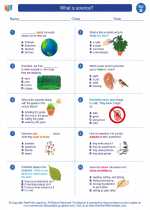Vacuoles
Vacuoles are membrane-bound organelles found in the cells of plants and some protists. They play a crucial role in maintaining the structural integrity of the cell and are involved in various cellular processes.
Structure of Vacuoles
Vacuoles are typically large, fluid-filled sacs surrounded by a membrane called the tonoplast. The fluid inside the vacuole, known as cell sap, contains water, enzymes, ions, and other molecules.
Functions of Vacuoles
Vacuoles serve several important functions in plant cells, including:
- Storage: Vacuoles store nutrients, water, and waste products. They are particularly important for maintaining turgor pressure, which helps support the plant structure.
- Waste management: Vacuoles contain enzymes that break down and detoxify waste products, helping to maintain cellular health.
- Regulation of turgor pressure: By controlling the movement of water into and out of the vacuole, plants can regulate turgor pressure, which is essential for maintaining rigidity and shape.
- Pigment storage: Some vacuoles contain pigments that give flowers and fruits their vibrant colors.
Study Guide
To understand vacuoles better, consider the following study guide:
- Describe the structure of a vacuole and its surrounding membrane.
- Explain the role of vacuoles in maintaining turgor pressure in plant cells.
- Discuss the functions of vacuoles in storing nutrients and waste products.
- Compare and contrast the vacuoles found in plant cells with those in animal cells.
- Investigate the importance of vacuoles in maintaining the health and vitality of plant cells.
By studying the structure and functions of vacuoles, you can gain a deeper understanding of their importance in plant biology and cellular physiology.
[Vacuoles] Related Worksheets and Study Guides:
.◂Science Worksheets and Study Guides Second Grade. What is science?
Study Guide What is science?
What is science?  Worksheet/Answer key
Worksheet/Answer key What is science?
What is science?  Worksheet/Answer key
Worksheet/Answer key What is science?
What is science?  Worksheet/Answer key
Worksheet/Answer key What is science?
What is science?  Vocabulary/Answer key
Vocabulary/Answer key What is science?
What is science? 

 Worksheet/Answer key
Worksheet/Answer key
 Worksheet/Answer key
Worksheet/Answer key
 Worksheet/Answer key
Worksheet/Answer key
 Vocabulary/Answer key
Vocabulary/Answer key

The resources above cover the following skills:
LIFE SCIENCE
Ecosystems: Interactions, Energy, and Dynamics
Obtain information from literature and other media to illustrate that there are many different kinds of living things and that they exist in different places on land and in water (e.g., woodland, tundra, desert, rainforest, ocean, river).
EARTH AND SPACE SCIENCE
Earth’s Systems
Make observations from media to obtain information about Earth’s events that happen over a short period of time (e.g., tornados, volcanic explosions, earthquakes) or over a time period longer than one can observe (e.g., erosion of rocks, melting of glaciers).
Collect and evaluate data to identify water found on Earth and determine whether it is a solid or a liquid (e.g., glaciers as solid forms of water; oceans, lakes, rivers, streams as liquid forms of water).